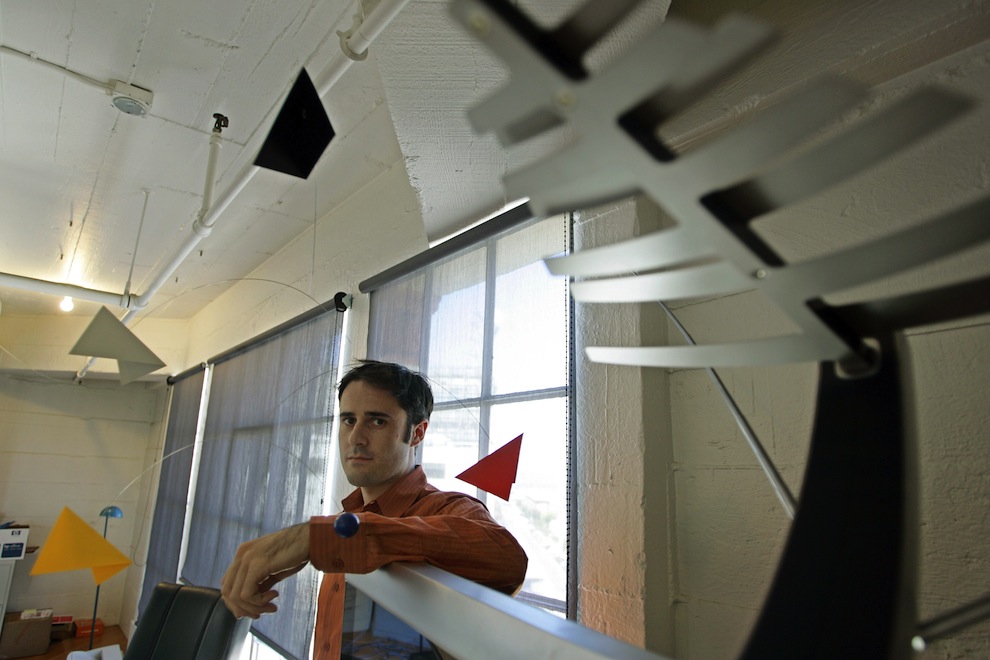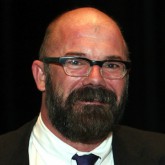Chapter 9
Birthing the Blogosphere

No, I think the media companies are in that business. They have content, and they move it out. You’d be doing that with physical paper, or you’d be doing that with TV. Then you look at the web, and obviously, it’s reasonable to use the web for doing that. I don’t think that was a mistake. I think that in the future we may see new genres.
The broadcast-only [model] went on for ages, and then somebody invented the blog, which was an easy way of making it so anybody could write an article. Wikis came out, and blogs came out. It was pretty easy to set up a wiki and pretty easy to set up a blog within particular areas, so you’d find all the bird watchers would get into the bird-watching blog, which would then become a wonderful resource.
For them that was a collaborative resource. Wiki was one of the things that allowed collaboration. Blogs were another genre. We’ve seen those two genres become fairly well known, but I feel that those are just two ideas.
The “somebodys” who invented the blog were software developers like Dave Winer, Meg Hourihan, Evan Williams, and others who started early blogging platforms.
The big thing that happened in the ’80s was desktop publishing. Desktop publishing dropped the cost of publishing. When I started [a company] in 1980, [we] got venture capital money and…bought this enormous laser printer. It was a very impressive capital investment. It was like half a million dollars. “We’re going to do our own typesetting and layout. We’re going to save a lot of money with this.” It was a bargain.
But by the time the ’80s were over, that same laser printer now cost $1,500. That was the process. The process of driving the cost of publishing down. Until the point where the web comes along in ’93, ’94. The cost of publishing goes almost to zero. When did I figure that out? I figured it out when PageMaker [a software program for the Mac made by Aldus, later acquired by Adobe] came out, and I saw what people were doing with it.
In 1985, a small-time radio personality in North Carolina named Doc Searls found himself out of work and moved to Palo Alto to open a small ad agency. Taking root in Silicon Valley, it would go on to represent many of the top companies of the time — Sun Microsystems, Apple, Logitech, Symantec, Hitachi Semiconductor — and eventually become one of the biggest agencies serving the tech industry. Searls himself was an early adopter to the power of the Internet and became a legendary early blogger, as well as co-author of The Cluetrain Manifesto, one of the seminal books about the effects of digital technology on markets.
I date the Internet that we know now and that I think will exist for the fullness of time to 1995. [That] was when the perfect storm of ISPs [Internet Service Providers]; dial‑up access; the graphical browser especially, that was the biggest thing; domain names for sale…. All of those things together made it possible for anybody to publish, for anybody to run their own radio station, for anybody to run their own TV station, for anybody to do what the hell they pleased in a space that we’d never seen before — that put all of us at zero distance from everybody else. It didn’t matter where we were in the world. At something close to no cost at all, anybody could communicate with anybody. Anybody could run their own printing press, as it were. To me that was just fundamental.
Seeing this “self-publishing” phenomenon as a tremendous liberator of information, Winer and others went hard at work on programs that would quickly enable anyone interested in anything to start creating and reaching communities around an infinite variety of subjects. So while the legacy media businesses grappled with their own Internet challenges, on the other end of the spectrum — from the bottom up — the blogosphere was born. We asked Winer, essentially, what it was about these platforms that made them catch on so dramatically.
It’s ease of use. It’s because we hacked at lowering the barrier to entry. We really hacked at it. Before we did Manila [an early content management system], I made a list of all the steps I had to go through to update a piece of writing on my website, and it was like 20-odd steps. They were all really frightfully complicated. I said, “We just need to get that list shorter,” so we hacked at it.

What brought you to WordPress?
Sure, so Movable Type [an early blogging platform] — I wasn’t crazy about the software. So I switched to something called b2. b2 was open source. I started hacking on it, contributing some code, which was a great way to learn how to code, because I really didn’t know…. b2 sort of was abandoned as an open source project. Myself and a fellow over in the U.K., Mike Little, picked it up and continued it, and that became WordPress.
In 2003, Mullenweg joined CNET, an early publisher of technology news on the web.
I remember a meeting I was in at CNET…a lot of early web folks were there. There’s this meeting and they were [demonstrating] their publishing system at the time that was called Comet or Ajax or something like that, and then they had a screen with WordPress on it.
I said, “Alright. Here’s a finished thing ready to publish. We’ll set a timer and let’s publish it live to the web on both,” and started the timer. Of course, on WordPress it took 15 seconds. I copy and pasted the article, pressed publish, and it’s live instantly. In their system — and this was probably the most uncomfortable meeting I’ve ever been in in my life — it was maybe 15 or 20 minutes. It had to rebuild things. It was excruciating, and all these engineers with gray beards were just glaring at me; glaring at me really angry.
For a lot of us who are writers, we could all become Benjamin Franklin. To me, he was the first blogger. Maybe Samuel Pepys was, but it was really Franklin with Poor Richard’s Almanack. He was kind of the first blogger, in a way. It was this self-published good, and the best blogs are really good and became worthy publications on their own.
[To Dave Winer:] Your definition of a blog is that it’s non-institutional and it’s the unedited voice of the individual?
No, the first part I wouldn’t include because it can be institutional. I was blogging as CEO of Userland Software for many, many years. That was very much a blog. There’s a buck-stops-here thing going on. There’s nobody else that’s responsible for this. It’s just me.
You’re unedited and you’re unaccountable.
I’m totally accountable.
To the — ?
To the readers. I’m more accountable than any of the writers at The Times are.
Unaccountable to an editor.
I see. That’s what you mean. Yeah, but I’m so accountable because I can’t spread it out. I wrote the whole thing. Every word in here is my word.
I feel, on the whole, blogs are probably more accurate, particularly in the long term. When I publish a blog post it’s not edited beforehand, it’s not fact-checked beforehand. But it’s my words, my name’s on it, I feel personally attached to it and if there’s anything wrong in it I get a comment within five minutes telling me about it. That was the beauty of blogs: That conversation would be transparent under the blog post.
Now that it was easy and fast to publish on the web, journalists began to use these new tools to circumvent their traditional intermediaries: legacy media companies. Some became “brands” on their own and attracted large audiences.
I started Gawker as a side project. My most successful ventures have tended to be side projects.
When I was in Silicon Valley, we reached out to people like David Winer. I wouldn’t say we were friends, but I knew David Winer. I did become quite friendly with the founders of Blogger, with Evan Williams and Meg Hourihan: Meg Hourihan, who I ended [up] working with later; Evan Williams, who I was going to partner with before he was acquired by Google. I was entranced by Blogger.
Blogging was a new form of publishing, but it was more than that. It was the essence of interactive engagement, and so it captured something that the interactive pioneers had known all along: that the web was fundamentally social. Jeff Jarvis recounts that moment for him:
I’d been around blogs. The confession here is that Nick Denton, now head of Gawker, was then heading up a startup called Moreover.
He showed me blogger. “Look!” He types something. He hits a button and there it is. I said, “BFD.” I didn’t get it. I didn’t understand the importance of blogs. I will fully confess. He showed this to me and I said, “So you published a page.”
After September 11th, I had more to say about the experience. I thought I would do it for a few weeks. I started blogging on Blogger.
The ding moment for me…maybe I put too much importance on it, but Nick knew some guys in L.A. named Ken Lane and Matt Welch, who were earlier bloggers. He said, “Hey, my friend was at the World Trade Center. Look what he wrote.” They wrote something about it and linked to it, to me. I linked back to them. I remember Nick lecturing me about the permalink; that I had just linked to the top of their site. No, you link right to their post.
The ding moment there was that I saw a conversation had occurred, in different places at different times. But it was a conversation. That was a lightening bolt of what the link enabled, and how the link changed the very structure of media from a product, a lecture, into a conversation. It really was a changing moment for me.
Tech journalist Om Malik was a rising star in Silicon Valley, having worked for Forbes.com, Red Herring, and Business 2.0, when he decided to launch his own company around his blog in 2006.
Not every publication can have 10 people working on a single story. Not every publication can hire Malcolm Gladwell. Not every publication can afford to pay David Carr.
My view is that, that is one way of doing things, then there is the blogger way of doing things, which is one man trying to obsessively cover an industry, or a topic, or a subject, and finding all sorts of information about that topic, subject or person, and then aggregating it on their blog.
Andrew Sullivan was a legendary political journalist and commentator — and the former editor of The New Republic — who established himself as a high-traffic blogger for Time.com, and later Atlantic.com and The Daily Beast. A substantially compensated, popular blogger for establishment publishers, he made the decision to set up shop on his own in 2013 with a unique and bold proposition. He would decline both investor and advertiser dollars, attempting to survive entirely by charging his readers to subscribe. We caught up with him in the tiny Greenwich Village apartment from which he works alongside two aging dogs and a handful of smart, eager collaborators and interns.
Andrew, when was the first time that you realized that this thing called the Internet was going to transform either journalism or transform your life as a journalist?
I knew it in an intellectual sense by the end of the ’90s. You just saw it…. I suddenly realized, when I put the first post up, I could put stuff up here that I hadn’t published elsewhere. This was the light bulb moment….
I slowly developed these little features that seemed like fun at the time…. One day I was like, I’d like the readers to see what I see every day,…which is a simply amazing litany and variety of people from every place on earth telling me stuff, communicating instantly. Not only instantly, but incredibly erudite, interesting people who were experts in their fields, obviously, and had things to tell me.
How do I get them to see each other? All they’re seeing is me. As an experiment I said, “Why don’t you take a picture on your digital camera of what you see when you look out your window every day? We’ll do it for a week.”
You’re still doing it.
I can point to the post where I’m like, “Please stop!” I was deluged with hundreds and hundreds. It’s just me sitting in my room.
They talked back.
Yeah, exactly! Now, some journalists aren’t likely to take to that very well. We won’t mention any names, but you can imagine. You’re thrown into this melee of conversation. Increasingly, I wanted their voices to be a part of it, so they also became part of it. I did that for six years by myself….
…This great thing means I can write anything. No one can stop me anymore. This is a writer’s dream: for a writer to reach his or her readership directly without any publisher, editor, colleague, advertiser, having to pass those hurdles, let alone the fact checker and the copy editor….
You’re still a blogger, basically.
Fuck, yeah. Yes! That spirit, the original spirit of, “I’m a blogger and I’m doing it because of freedom,” is still, I would say, my primary objective. I don’t want to become a Huffington Post.
There was, however, one person who did want to become The Huffington Post: Arianna Huffington, also an early blogger, who built a site that aggregated content from across the web, a company she and her partners sold to AOL for more than $300 million in 2011 after it had attracted more than 25 million unique visitors per month.
I don’t remember the first thing that got my attention [online]. But what fascinated me was the engagement, the fact that writers who are no longer just writing and leaving the scene, but staying there to engage with readers, and that readers had a voice. Whether it was in chat rooms or forums or the early version of what was happening online, something new was happening.






